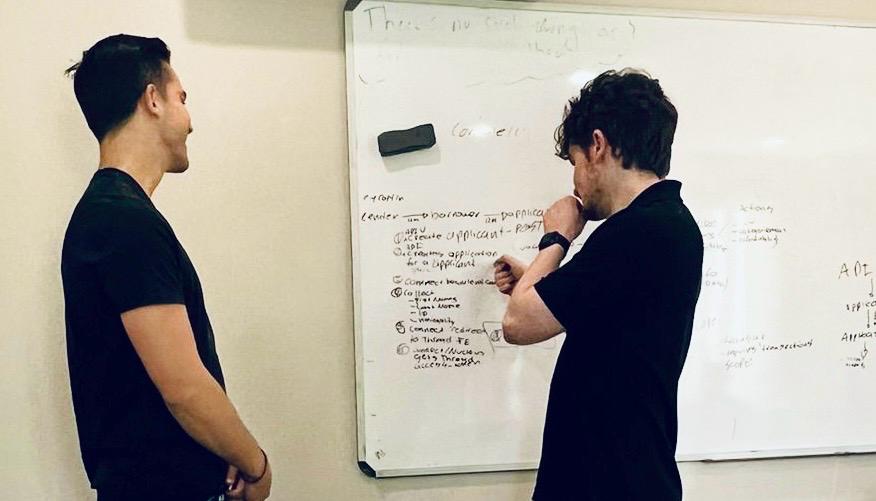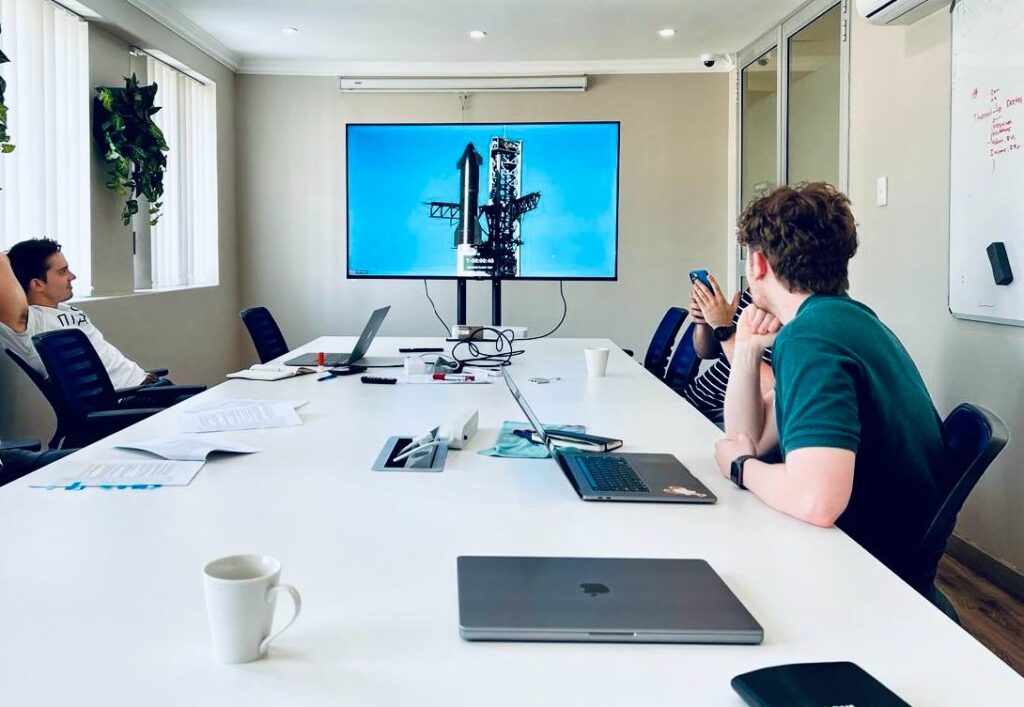Nic and I studied Actuarial Science at Wits and a mutual friend introduced us to Tim and Adam, who come from entrepreneurial and start-up backgrounds, having successfully built their own tech start-up over the last 6 years, which is now a mature business. We had a lot in common as we’d all been involved in starting and building successful businesses in the software and mobile telecoms spaces and we had experience building and scaling software-based products. So we knew each other socially, and in 2022 we went out for a steak at The Grillhouse and we were discussing the various changes that were happening in our lives as young professionals. Everyone was in a place where they were looking at houses to buy or rent, hoping to buy a new car and trying to apply for credit. At the dinner I shared a story that had happened to me that week and it led to a discussion that resonated with all of us.
A few years ago we started Pygio, a software development business specialising in custom builds and data analytics. By 2023 we were growing steadily and the time had come where I needed a new laptop. So I went to the iStore on Sandton Drive. I had enough savings to buy a new laptop but it was quite an expensive laptop (around R60 000) but, you know, I live on my machine and my machine is my work so getting this upgrade for work was quite important to me. And I really needed this laptop. What happened was I’d asked to get it on credit as I’d heard that the iStore on Alice Lane offered financing through Vodacom. That meant I’d buy the machine and get a Vodacom data package, and I thought, “Why not? I’d rather spend R2,500 or R3,000 a month and pay off this machine over 24 months”, than fork out R60 000 or R 70 000 once off which would hurt my cash flow for the month.
So I thought, “Why not?” I’ve never taken out any credit before, I’ve never had any debt or a credit card, I’ve never had a mortgage. I live at home with my parents (which is great) so I never had a rental property and I bought my car cash with some savings from work. I went through the whole process of applying for credit for this laptop from the iStore and Vodacom. It was a whole process of getting together every possible document in order to prove my creditworthiness – my parents birth certificates, my blood samples, my stool sample, whatever, I gave them everything. It was quite a long process and it took about a week. After going to the store and understanding what I had to provide (bank statements etc.) eventually they came back and told me my credit application was rejected. This didn’t make sense to me at all, but what I later realised is that it was because I was what is known in the industry as a ‘thin file customer.’ But essentially the message from them was, “You’re unlendable.” So for me personally, there was a massive pain point. I ended up buying the laptop using savings, which I didn’t want to do.
The following week I was out to dinner with Nicolas, Tim and Adam and Tim shared his story, which was that he was looking to move out of a rental and perhaps buy a house. He was looking at the options between buying and renting and while going through the process of applying for a rental, very quickly realised that he was also thin-file from a credit bureau point of view which made it difficult for the landlord to accurately risk-rate him. So he also got rejected and was forced back into the rental market. Anyway, we connected over these stories and it occurred to us that we’re not the type of people that are high credit risk, or at least we didn’t perceive ourselves to be. We were cash flow positive. We had stable incomes. We saved more than what we spent on a month to month basis.
“Why was it that neither of us could access credit for reasonable things?”
So we started looking deeper into this problem. And what we uncovered was that we were both ‘thin-file customers.’ And the way we did that was we went and found our credit scores on clearscore.com. We downloaded our credit profile and we were both -1. We thought, “What does -1 mean?” Usually credit scores for lendable consumers are around 750 or 700, but “-1” means that the credit bureau has no data on you. This means that they have no way of telling (based on the information they have) what type of risk you might be. If you’ve never had a credit product, no lender would have ever reported your data to a credit bureau. This catch-22 is part of the problem.
“It’s a chicken and egg situation: if you don’t have a credit score you can’t get credit, and if you don’t have credit you don’t have a credit score.”
We started doing research around the problem and the market. Some of the questions that came to mind were “I wonder who is solving this?” and “Are there companies that help young people like us (or thin file customers) get credit?” We started thinking about what would need to happen for people to have better access to credit. At this point we had started asking people in our circle who were at a similar life stage whether they had experienced the same problem. The feedback overwhelmingly validated our hypothesis: that getting credit if you have no credit score is a big problem, and no-one is solving it well.

In South Africa, 25% of the population (around 15 million people) are considered ‘thin file customers’ meaning that the Tier 1 bureaus (Experian, TransUnion, XDS, Vericred etc) are unable to view any credit history on these consumers.
We looked at PSD2 regulation and open banking in Europe and the UK and quickly realised there were fintech startups (Credit Kudos, Bud, Tink) pioneering this by doing transactional cash flow underwriting and risk assessment.
Now, 85% of the SA population is banked thanks to Capitec leading the charge (and by 2026 it is estimated to be around 95%) so that problem is being solved and the NCA mandates that lenders look at consumer’s bank statements from the past three months.
So based on the market size and pain points, we felt that there was an opportunity for disruption – particularly around leveraging real-time transaction data. We started looking at bank statements and then we started looking at whether we could access bank statements on the whole population. So we said, “If we could enter this data sharing ecosystem and look at bank statements, could we do credit scoring better?” If everyone has transaction data then there is a way to credit score them. We can assist lenders to risk underwrite people based on transaction data. And that’s how Beam started.
After several meetings and whiteboard sessions in the Ignite boardroom, we realised that the skill sets of an actuary, a data scientist, a software engineer and an entrepreneur were a pretty good combination to solve this problem. It turned out that Adam had built some IP (a Portal Emulation) that made it really easy for consumers to allow Beam to access their bank statements. We were able to adapt that to the credit vetting use case. We then developed a business model and UX/UI-focussed software solution that would supply lenders with tools and access to bank statement data by onboarding borrowers and then applying machine learning to that data to effectively perform a risk analysis of the customer. I won’t go into the details of what the product does, that’s for another post but by April 2023, Beam was a registered company and we were meeting with potential clients to talk about the opportunity. The response so far has been overwhelmingly positive and we’ve received a huge amount of feedback that’s allowed us to refine our offering and make it the best solution for the South African market in this space.
About Beam
Beam is a fintech company founded in South Africa. Our software solution helps organisations make better credit decisions by seamlessly distilling a broad range of data sources in real-time
We enable risk officers to access all the information they need to analyse their customers in one place, and make it easy to make more informed choices throughout the credit and risk lifecycle. Our state-of-the-art software and API-driven model enable better collaboration and visibility between credit professionals, technical teams and management.



